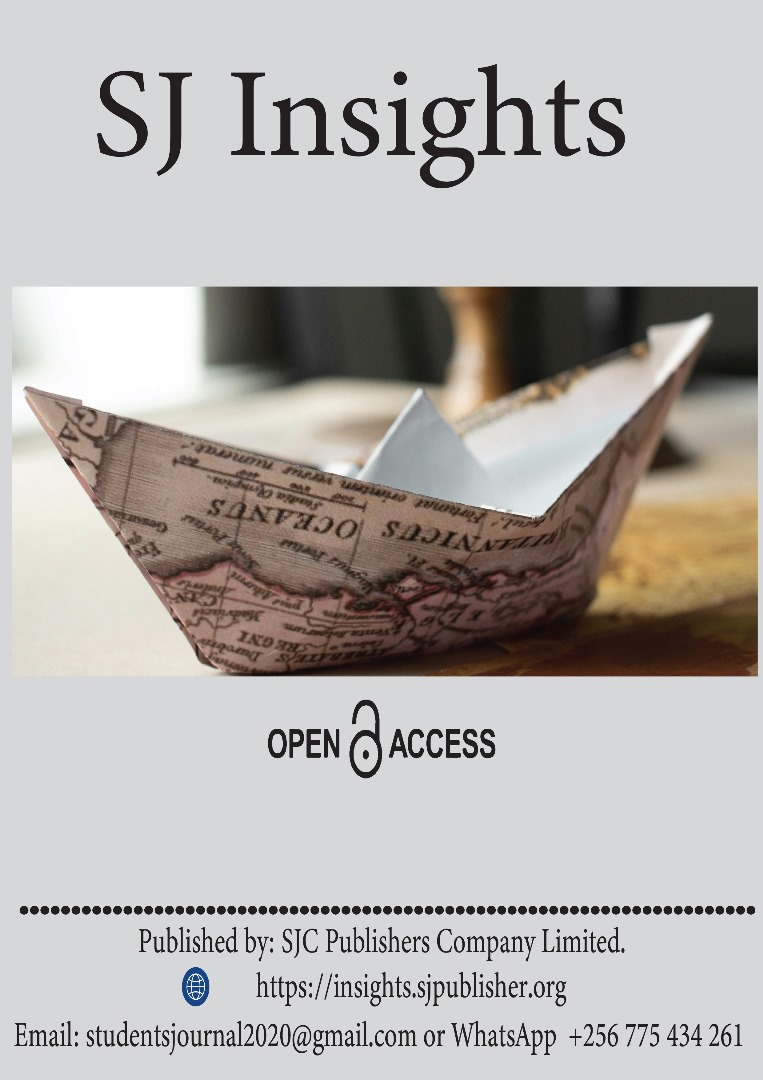Influence of school disciplinary policies on pupil performance in Universal Primary Education (UPE) schools. A cross-sectional study.
DOI:
https://doi.org/10.51168/insights.v2i10.47Keywords:
School disciplinary policies, Pupil performance, Universal Primary Education schoolsAbstract
Background
Primary schools in Wakiso District have a number of policies in place. The study examined how school disciplinary policies influence pupil performance in Universal Primary Education (UPE) schools.
Methodology
The study employed a descriptive, correlational, and cross-sectional survey design, integrating both quantitative and qualitative methods. A total of 169 respondents were purposively and stratified sampled from a population of 300, including head teachers, teachers, and Primary Seven pupils. Data were collected using questionnaires, interviews, and documentary review checklists.
Results
80 (53.3%) of the respondents were male, while 70 (46.7%) were female. The statement “The school has clear disciplinary policies known to pupils” had a mean of 2.40, implying that in most schools, pupils were either unaware of or not clearly informed about the disciplinary guidelines. The existence of rules for maintaining punctuality (M = 2.47) and classroom behavior (M = 2.58) was reported as weak, suggesting inconsistency in enforcing attendance and behavioral standards. Regarding respect for teachers and peers, the mean of 2.67 showed that while some level of regulation exists, it is not strongly upheld. Rules governing the use of school property (M = 2.59) and dress code (M = 2.59) were also rated low, pointing to inadequate supervision or enforcement mechanisms. Only a few pupils agreed that they could consistently answer questions during lessons (M = 2.10, SD = 0.98) or perform well in end-of-term examinations (M = 2.10, SD = 0.98). The standardized coefficient (β = 0.30, p < 0.01) indicates that disciplinary
policies have a positive and statistically significant effect on academic performance. This suggests that
Conclusions
This indicates that schools with well-defined, consistently enforced, and non-punitive disciplinary measures tend to have pupils who perform better academically.
Recommendations
Schools should establish well-documented disciplinary policies that are communicated to both teachers and pupils.
References
Anderson, K. P., Ritter, G. W., & Zamarro, G. (2019). Understanding a vicious cycle: The relationship between student discipline and student academic outcomes. Educational Researcher, 48(5), 251-262. https://doi.org/10.3102/0013189X19848720
Ategeka, S., & Ssenyonga, J. (2021). The role of positive disciplinary strategies on learner behavior and performance in Ugandan primary schools. Journal of Education and Development, 5(2), 45-58.
Erten, S., & Köseoğlu, P. (2022). A review of studies in the field of educational sciences within the context of the Theory of Planned Behavior. Journal of Turkish Science Education, 19(2). https://doi.org/10.36681/tused.2022.127
Mammadov, R., & Çimen, I. (2019). Optimizing teacher quality based on student performance: A Data Envelopment Analysis on PISA and TALIS. International Journal of Instruction, 12(4), 767-128. https://doi.org/10.29333/iji.2019.12449a
Nakabugo, M. G., Byamugisha, A., & Muhangi, G. (2019). School climate and academic achievement in Uganda's Universal Primary Education schools. Africa Education Review, 16(1), 20-34. https://doi.org/10.1080/18146627.2016.1224575 https://doi.org/10.1080/18146627.2016.1224575
Nakalema, J. E. (2022). Continuous professional development and job performance of nursery school teachers in Nangabo Sub-County, Wakiso District [Unpublished work], Makerere University.
Nanyonjo, M. (2024). The use of problem-based learning in the development of creative writing skills: A case of MHS in Wakiso District. [Unpublished work].
Tumuheire, D. (2020). Corporal punishment and pupil performance in selected primary schools in western Uganda. Makerere Journal of Education and Social Sciences, 10(1), 66-79.Appendix V: Kreijcie & Morgan (1970) table of Sample Determination
Downloads
Published
How to Cite
Issue
Section
License
Copyright (c) 2025 Betty Nalugwa, Dr. Muhammad Ssendagi, Edmand Bakashaba

This work is licensed under a Creative Commons Attribution-NonCommercial-NoDerivatives 4.0 International License.




